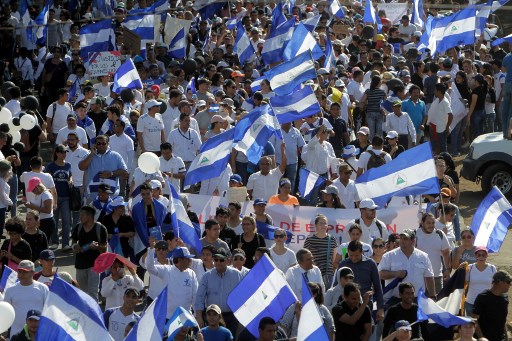
Ortega was under pressure from widespread street unrest on Monday despite backing down on a contentious pension reform plan that triggered days of violence in which at least 27 people have been killed. / AFP PHOTO
by Marco SIBAJA
Agence France Presse
MANAGUA, Nicaragua (AFP) — Nicaraguan President Daniel Ortega was under pressure from widespread street unrest Monday despite backing down on a contentious pension reform plan that triggered days of violence in which at least 27 people have been killed.
Tens of thousands of people poured into the streets of the capital Managua in the evening hours to demand an end to the repression against protesters in the latest anti-government demonstration.
Workers, students, business people and ordinary residents carried Nicaraguan flags and wore white or black shirts as they marched peacefully while singing the national anthem or shouting slogans against the government and in favor of arrested students.
Students leading the protests vowed to keep up their demonstrations until the 72-year-old leader and his wife, vice-president Rosario Murillo, are ousted.
In a bid to ease the tension, Ortega and Murillo held a press conference in which they promised to free those arrested during the protests in order “to create a basis for dialogue.”
The death toll increased after officials said a policeman had succumbed to injuries sustained on Sunday and the Nicaraguan Center for Human Rights also upped its count of victims by one.
Street protests are extremely rare in Nicaragua, where the army maintains a very tight grip on public order, with the current wave of unrest being the worst ever seen during Ortega’s 11 years in power.
With the situation on a knife-edge in the Central American nation, Washington ordered the families of US diplomatic personnel to leave.
United Nations Secretary-General Antonio Guterres called for “restraint on all sides” and urged the government to “ensure the protection of human rights of all citizens, particularly the right to peaceful assembly and freedom of expression.”
Despite Ortega’s U-turn, Nicaragua’s main private business association — which has been an ally throughout his time in office — went ahead with the latest anti-government march.
The embattled president had tried to placate the protesters on Sunday by revoking a pension reform plan that would have increased both employer and employee contributions and reduced benefits, in a bid to cap a rising $76 million deficit at the Nicaraguan Social Security Institute (INSS).
It was that plan that first sparked a wave of student protests on Wednesday that quickly spread to other sectors of Nicaraguan society.
‘No space for dialogue’
“The protests are no longer just about the INSS, it is against a government that denies us freedom of expression, freedom of the press and to demonstrate peacefully,” 26-year-old political science student Clifford Ramirez told AFP.
“We believe there is no longer space for dialogue.”
The demonstrators won the backing of workers and retirees angered by government corruption and the deterioration in living conditions, with people coming out to show their support by banging kitchen pots.
Over the weekend, the protests intensified in Managua with demonstrators erecting barricades of burning tires in the streets as mobs ransacked shops in various parts of the city.
Ortega responded by sending in riot police, deploying the army and cracking down on independent media as well as deploying pro-government demonstrators to counter the protests.
Protesters said the security forces used live fire against them, with one doctor who treated the wounded confirming the police were using deadly force.
“The wounds suffered by students have been from firearms,” Eyel Almanza told AFP.
Streets were largely empty in the capital, with few people going to work.
The unexpected wave of violence in an otherwise relatively tightly-controlled country has prompted international outrage and concern, with the United States, the European Union and Pope Francis all calling for calm.
‘Halt the brutal attacks’
Despite Ortega’s efforts to ease the situation, Managua’s auxiliary bishop Silvio Baez said he saw no signs that the crisis was close to ending.
“I don’t see any conditions for dialogue with Nicaragua’s government,” he wrote on Twitter, calling for an end to the “repression,” the freeing of arrested youths and the lifting of a broadcast ban on an independent television station.
Other groups demanded Ortega rein in the security forces.
“We demand that the Nicaraguan government cease the brutal attacks against the demonstrators and the civilian population,” the Nicaraguan Center for Human Rights said in a joint statement with the International Federation for Human Rights.
The two organizations said protesters, minors, police officers and members of the Sandinista Youth were among the dead.
On Saturday, a journalist was shot dead while reporting on the chaos in the Caribbean city of Bluefields.
‘We want new leaders’
Before his U-turn late Sunday, Ortega had agreed to hold talks with the private sector, only to be rebuffed by business leaders who said there could be no dialogue unless his government “immediately ceases police repression.”
Ramirez said the bloodshed ruled out any chance of resolving the crisis through talks.
“We can no longer accept this government, we are protesting so that the Ortega-Murillo couple leave power,” the student added.
He said young people do not feel represented by the opposition parties that have in recent years backed Ortega, nor by the business leaders who supported him since his return to power in 2007.
“Since the Sandinista Revolution in 1979, we’ve had the same political leaders, they don’t let anyone else come in,” he said.
“We want a new leadership who represents the youth.”
© Agence France-Presse







